| Listing 1 - 10 of 10 |
Sort by
|
Book
ISBN: 9780674046023 0674046021 0674056205 9780674056206 Year: 2010 Publisher: Cambridge, MA
Abstract | Keywords | Export | Availability | Bookmark
 Loading...
Loading...Choose an application
- Reference Manager
- EndNote
- RefWorks (Direct export to RefWorks)
Explores the history of China between the Mongol reunification of China in 1279 under the Yuan dynasty and the Manchu invasion four centuries later, explaining how climate changes profoundly affected the empire during this period.
History of Asia --- anno 1600-1699 --- anno 1200-1499 --- anno 1500-1599 --- China --- Despotism --- Complexity (Philosophy) --- Despotisme --- Complexité (Philosophie) --- History. --- Social aspects --- Histoire --- Aspect social --- South China Sea Region --- Chine --- Chine méridionale, Région de la mer de --- History --- Economic conditions --- Commerce --- Environmental conditions. --- Conditions économiques --- Environnement --- Environmental aspects --- South China Sea --- Environmental conditions --- S04/0660 --- S04/0670 --- China: History--Yuan: .... - 1368 --- China: History--Ming: 1368 - 1644 --- China -- Economic conditions -- To 1644. --- China -- Environmental conditions. --- China -- History -- Ming dynasty, 1368-1644. --- China -- History -- Yuan dynasty, 1260-1368. --- Commerce -- Environmental aspects -- China -- History. --- Commerce -- Social aspects -- China -- History. --- Complexity (Philosophy) -- Social aspects -- China -- History. --- Despotism -- China -- History. --- Regions & Countries - Asia & the Middle East --- History & Archaeology --- East Asia --- Complexité (Philosophie) --- Chine méridionale, Région de la mer de --- Conditions économiques --- Trade --- Absolutism --- Autocracy --- Tyranny --- Biển Đông --- China Sea, South --- Dagat Timog Tsina --- Laut Cina Selatan --- Laut Tiongkok Selatan --- Laut Tjina --- Mar da China Meridional --- Minami Shinakai --- Nan Hai --- Nan Kai --- Nan Zhongguo Hai --- Thalē Čhīn Tai --- Cina --- Kinë --- Cathay --- Chinese National Government --- Chung-kuo kuo min cheng fu --- Republic of China (1912-1949) --- Kuo min cheng fu (China : 1912-1949) --- Chung-hua min kuo (1912-1949) --- Kina (China) --- National Government (1912-1949) --- China (Republic : 1912-1949) --- People's Republic of China --- Chinese People's Republic --- Chung-hua jen min kung ho kuo --- Central People's Government of Communist China --- Chung yang jen min cheng fu --- Chung-hua chung yang jen min kung ho kuo --- Central Government of the People's Republic of China --- Zhonghua Renmin Gongheguo --- Zhong hua ren min gong he guo --- Kitaĭskai︠a︡ Narodnai︠a︡ Respublika --- Činská lidová republika --- RRT --- Republik Rakjat Tiongkok --- KNR --- Kytaĭsʹka Narodna Respublika --- Jumhūriyat al-Ṣīn al-Shaʻbīyah --- RRC --- Kitaĭ --- Kínai Népköztársaság --- Chūka Jinmin Kyōwakoku --- Erets Sin --- Sin --- Sāthāranarat Prachāchon Čhīn --- P.R. China --- PR China --- Chung-kuo --- Zhongguo --- Zhonghuaminguo (1912-1949) --- Zhong guo --- République Populaire de Chine --- República Popular China --- Catay --- VR China --- VRChina --- 中國 --- Jhongguó --- Bu̇gu̇de Nayiramdaxu Dundadu Arad Ulus --- Bu̇gu̇de Nayiramdaqu Dumdadu Arad Ulus --- Bu̇gd Naĭramdakh Dundad Ard Uls --- Khi︠a︡tad --- Kitad --- Dumdadu Ulus --- Dumdad Uls --- Думдад Улс --- Kitajska --- 中国 --- 中华人民共和国 --- Authoritarianism --- Dictatorship --- Totalitarianism --- Philosophy --- Emergence (Philosophy) --- Economics --- Business --- Transportation --- Environmental aspects&delete& --- Social aspects&delete& --- China (Republic : 1949- ) --- PRC --- P.R.C. --- BNKhAU --- БНХАУ --- Traffic (Commerce) --- Merchants --- East Sea (South China Sea) --- Despotism - China - History --- Complexity (Philosophy) - Social aspects - China - History --- Commerce - Social aspects - China - History --- Commerce - Environmental aspects - China - History --- China - History - Yuan dynasty, 1260-1368 --- China - History - Ming dynasty, 1368-1644 --- China - Environmental conditions --- China - Economic conditions - To 1644 --- South China Sea - Commerce - History
Book
ISBN: 0892640758 0892640766 Year: 1988 Volume: v. 58 Publisher: Ann Arbor University of Michigan. Center for Chinese studies
Abstract | Keywords | Export | Availability | Bookmark
 Loading...
Loading...Choose an application
- Reference Manager
- EndNote
- RefWorks (Direct export to RefWorks)
China --- Gazetteers --- Bibliography. --- Description and travel --- S04/0100 --- S03/0100 --- S04/0670 --- S04/0420 --- S03/0210 --- China: History--Bibliographies, dictionaries, yearbooks and collections: general and before 1840 --- China: Geography, description and travel--Bibliographies, dictionaries, yearbooks and collections --- China: History--Ming: 1368 - 1644 --- China: History--Gazetteers (fangzhi 方志) general --- China: Geography, description and travel--Chinese geography, description and travels: before 1840 --- -Bibliography. --- Cina --- Kinë --- Cathay --- Chinese National Government --- Chung-kuo kuo min cheng fu --- Republic of China (1912-1949) --- Kuo min cheng fu (China : 1912-1949) --- Chung-hua min kuo (1912-1949) --- Kina (China) --- National Government (1912-1949) --- China (Republic : 1912-1949) --- People's Republic of China --- Chinese People's Republic --- Chung-hua jen min kung ho kuo --- Central People's Government of Communist China --- Chung yang jen min cheng fu --- Chung-hua chung yang jen min kung ho kuo --- Central Government of the People's Republic of China --- Zhonghua Renmin Gongheguo --- Zhong hua ren min gong he guo --- Kitaĭskai︠a︡ Narodnai︠a︡ Respublika --- Činská lidová republika --- RRT --- Republik Rakjat Tiongkok --- KNR --- Kytaĭsʹka Narodna Respublika --- Jumhūriyat al-Ṣīn al-Shaʻbīyah --- RRC --- Kitaĭ --- Kínai Népköztársaság --- Chūka Jinmin Kyōwakoku --- Erets Sin --- Sin --- Sāthāranarat Prachāchon Čhīn --- P.R. China --- PR China --- Chung-kuo --- Zhongguo --- Zhonghuaminguo (1912-1949) --- Zhong guo --- Chine --- République Populaire de Chine --- República Popular China --- Catay --- VR China --- VRChina --- 中國 --- 中国 --- 中华人民共和国 --- Jhongguó --- Bu̇gu̇de Nayiramdaxu Dundadu Arad Ulus --- Bu̇gu̇de Nayiramdaqu Dumdadu Arad Ulus --- Bu̇gd Naĭramdakh Dundad Ard Uls --- Khi︠a︡tad --- Kitad --- Dumdadu Ulus --- Dumdad Uls --- Думдад Улс --- Kitajska --- China (Republic : 1949- ) --- PRC --- P.R.C. --- BNKhAU --- БНХАУ
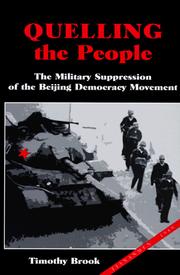
ISBN: 0804736383 Year: 1999 Publisher: Stanford (Calif.): Stanford university press
Abstract | Keywords | Export | Availability | Bookmark
 Loading...
Loading...Choose an application
- Reference Manager
- EndNote
- RefWorks (Direct export to RefWorks)
This is a unique, day-by-day, hour-by-hour reconstruction of the massacre in Tiananmen Square on June 3-4, 1989, as well as of the crucial events in Beijing during the previous weeks that largely precipitated the massacre. The author focuses on the army (the People's Liberation Army), which, with its motto 'Serve the People', had always prided itself on its close ties to the civilian population. What were the intentions of the Chinese government in mobilizing the army against civilians? Why did the troops act as they did, and what does this say about how the army would act on the next such occasion? How does the military suppression of the democracy movement help us to understand China's current predicament concerning democratization and human rights?
S06/0500 --- S07/0200 --- China: Politics and government--Other modern political movements (e.g. anarchism, Socialism, dissident movements, Beijing Spring, Tian'anmen) --- China: Army and police force--Military history --- China --- History --- -S06/0500 --- Cina --- Kinë --- Cathay --- Chinese National Government --- Chung-kuo kuo min cheng fu --- Republic of China (1912-1949) --- Kuo min cheng fu (China : 1912-1949) --- Chung-hua min kuo (1912-1949) --- Kina (China) --- National Government (1912-1949) --- China (Republic : 1912-1949) --- People's Republic of China --- Chinese People's Republic --- Chung-hua jen min kung ho kuo --- Central People's Government of Communist China --- Chung yang jen min cheng fu --- Chung-hua chung yang jen min kung ho kuo --- Central Government of the People's Republic of China --- Zhonghua Renmin Gongheguo --- Zhong hua ren min gong he guo --- Kitaĭskai︠a︡ Narodnai︠a︡ Respublika --- Činská lidová republika --- RRT --- Republik Rakjat Tiongkok --- KNR --- Kytaĭsʹka Narodna Respublika --- Jumhūriyat al-Ṣīn al-Shaʻbīyah --- RRC --- Kitaĭ --- Kínai Népköztársaság --- Chūka Jinmin Kyōwakoku --- Erets Sin --- Sin --- Sāthāranarat Prachāchon Čhīn --- P.R. China --- PR China --- Chung-kuo --- Zhongguo --- Zhonghuaminguo (1912-1949) --- Zhong guo --- Chine --- République Populaire de Chine --- República Popular China --- Catay --- VR China --- VRChina --- 中國 --- 中国 --- 中华人民共和国 --- Jhongguó --- Bu̇gu̇de Nayiramdaxu Dundadu Arad Ulus --- Bu̇gu̇de Nayiramdaqu Dumdadu Arad Ulus --- Bu̇gd Naĭramdakh Dundad Ard Uls --- Khi︠a︡tad --- Kitad --- Dumdadu Ulus --- Dumdad Uls --- Думдад Улс --- Kitajska --- -China --- Histoire
Book
ISBN: 0691250405 9780691250403 9780691253701 Year: 2023 Publisher: Princeton Princeton University Press
Abstract | Keywords | Export | Availability | Bookmark
 Loading...
Loading...Choose an application
- Reference Manager
- EndNote
- RefWorks (Direct export to RefWorks)
"How climate change ushered in the collapse of one of history's mighty empires. In 1644, after close to three centuries of relative stability and prosperity, the Ming dynasty collapsed. Many historians attribute its demise to the Manchu invasion of China, but the truth is far more profound. The Price of Collapse provides an entirely new approach to the economic and social history of China, exploring how global climate crisis spelled the end of Ming rule.The mid-seventeenth century witnessed the deadliest phase of the Little Ice Age, when temperatures and rainfall plunged and world economies buckled. Timothy Brook draws on the history of grain prices to paint a gripping portrait of the final tumultuous years of a once-great dynasty. He explores how global trade networks that increasingly moved silver into China may have affected prices and describes the daily struggle to survive amid grain shortages and famine. By the early 1640s, as the subjects of the Ming found themselves caught in a deadly combination of cold and drought that defied all attempts to stave off disaster, the Ming price regime collapsed, and with it the Ming political regime.A masterful work of scholarship, The Price of Collapse reconstructs the experience of ordinary people under the immense pressure of unaffordable prices as their country slid from prosperity to calamity and shows how the market mediated the relationship between an empire and the climate that turned against it."
Climat --- Climatic changes --- Climatic changes. --- Economic history. --- SCIENCE / History. --- Changements --- Histoire --- History --- 1368-1699. --- China --- China. --- Chine --- Economic conditions --- Conditions économiques --- History of Asia --- anno 1600-1699
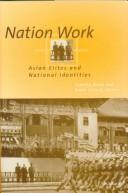
ISBN: 0472110322 0472087649 Year: 1999 Publisher: Ann Arbor University of Michigan press
Abstract | Keywords | Export | Availability | Bookmark
 Loading...
Loading...Choose an application
- Reference Manager
- EndNote
- RefWorks (Direct export to RefWorks)
As increasing attention is drawn to globalization, questions arise about the fate of "the nation," a political and social unit that for centuries has seemed the common-sense way to organize the world. In Nation Work, Timothy Brook and AndréSchmid draw together eight essays that use historical examples from Asian countries--China, India, Korea, and Japan--to enrich our understandings of the origin and growth of nations. Asia provides fertile ground for this inquiry, the volume argues, because in Asia the history of the modern nation has been inseparable from global influences in the form of Western imperialism. Yet, while the impetus for building a modern national identity may have come from the need to fashion a favorable place in a world system dominated by Western nations, those engaged in nationalist enterprises found their particular voices more often in relation to tensions within Asia than in relation to more generic tensions between Asia and the West. With topics ranging from public health measures in nineteenth-century Japan through textual scholarship of Tamil intellectuals, the willful division of Korea's history from China's, the development of China's cotton industry, and the meaning of "postnational-ism" for Chinese artists, the essays reveal the fascinating array of sites at which nation work can take place. This will be essential reading for historians and social scientists interested in Asia. Timothy Brook is Professor of History, Stanford University. AndréSchmid is Assistant Professor of East Asian Studies, University of Toronto.
Nationalism --- Elite (Social sciences) --- Nationalisme --- Elite (Sciences sociales) --- History --- History. --- Histoire --- S02/0100 --- S02/0200 --- S11/0708 --- Consciousness, National --- Identity, National --- National consciousness --- National identity --- International relations --- Patriotism --- Political science --- Autonomy and independence movements --- Internationalism --- Political messianism --- Elites (Social sciences) --- Leadership --- Power (Social sciences) --- Social classes --- Social groups --- China: General works--China (and Asia) general surveys: before 1949 --- China: General works--Civilization and culture --- China: Social sciences--Elite --- East Asia --- Nationalism - East Asia - History. --- Elite (Social sciences) - East Asia - History.
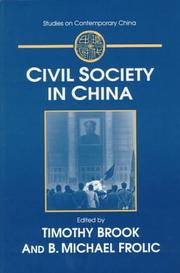
ISBN: 0765600919 0765600927 1317474376 1315705613 1317474384 1336138629 Year: 1997 Publisher: Armonk Sharpe
Abstract | Keywords | Export | Availability | Bookmark
 Loading...
Loading...Choose an application
- Reference Manager
- EndNote
- RefWorks (Direct export to RefWorks)
The concept of civil society was borrowed from 18th-century Europe to provide a framework for understanding the transition to post-authoritarian regimes in Latin America and post-communist regimes elsewhere. This book asks whether this concept is useful for analyzing China.
Civil society --- Democracy --- Société civile --- Démocratie --- China --- Chine --- Politics and government --- Politique et gouvernement --- S06/0500 --- S06/0424 --- China: Politics and government--Other modern political movements (e.g. anarchism, Socialism, dissident movements, Beijing Spring, Tian'anmen) --- China: Politics and government--CCP: since 1989 --- Associations, institutions, etc. --- Société civile --- Démocratie --- Associations, institutions, etc
Book
ISBN: 9782228904933 2228904937 Year: 2010 Publisher: Paris : Payot,
Abstract | Keywords | Export | Availability | Bookmark
 Loading...
Loading...Choose an application
- Reference Manager
- EndNote
- RefWorks (Direct export to RefWorks)
Merchant marine --- Trade routes --- Marine marchande --- Routes commerciales --- History --- Histoire --- Netherlands --- China --- Pays-Bas --- Chine --- Commerce --- Mondialisation --- --XVIIe s., --- Histoire culturelle --- --Civilization, Modern --- Culture and globalization --- Vermeer, Johannes, --- Themes, motives --- XVIIe s., 1601-1700 --- Civilization, Modern - 17th century --- Vermeer, Johannes, - 1632-1675 - Themes, motives --- Vermeer, Johannes (1632-1675) --- Civilisation --- Europe --- Critique et interprétation --- 17e siècle --- Relations --- Civilization, Modern --- Vermeer, Johannes, - 1632-1675
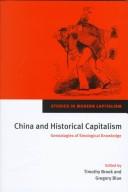
ISBN: 0521640296 0521525918 0511470703 Year: 2002 Publisher: Cambridge Cambridge University press
Abstract | Keywords | Export | Availability | Bookmark
 Loading...
Loading...Choose an application
- Reference Manager
- EndNote
- RefWorks (Direct export to RefWorks)
This book addresses the historical relationship that has arisen between the concept of capitalism and the idea of China. Formulated by European intellectuals in order to identify the social formation in which they found themselves, capitalism was portrayed as unique to Europe and as an organic outgrowth of Western civilization. In this way, China was rejected as a model of civilization, and seen merely as despotic, feudal or stagnant. This Eurocentric judgement has hung over all subsequent thinking about China, even influencing Chinese perceptions of their own history. The aim of this collaborative project is to examine how the experience of capitalism as a European social formation and as a world-system has shaped knowledge of China. In addition the volume aims to establish new foundations on which a theory of Chinese society might be built, in order to perceive and understand Chinese development in less Eurocentric terms.
Capitalism --- Mixed economy --- History. --- China --- Economic conditions. --- S02/0300 --- S04/0200 --- China: General works--Chinese culture and the West and vice-versa --- China: History--Historiography and theory of history --- Capitalisme --- Economie mixte --- History --- Histoire --- Chine --- Conditions économiques --- Arts and Humanities
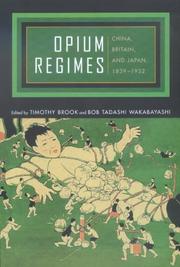
ISBN: 0520220099 0520222369 Year: 2000 Publisher: Berkeley University of California press
Abstract | Keywords | Export | Availability | Bookmark
 Loading...
Loading...Choose an application
- Reference Manager
- EndNote
- RefWorks (Direct export to RefWorks)
Opium is more than just a drug extracted from poppies. Over the past two centuries it has been a palliative medicine, an addictive substance, a powerful mechanism for concentrating and transferring wealth and power between nations, and the anchor for a now vanished sociocultural world in and around China. 'Opium Regimes' integrates the pioneering research of sixteen scholars to show that the opium trade was not purely a British operation but involved Chinese merchants, Chinese state agents, and Japanese imperialists as well. The book presents a coherent historical arc that moves from British imperialism in the nineteenth century, to Chinese capital formation and state making at the turn of the century, to Japanese imperialism through the 1930s and 1940s, and finally to the apparent resolution of China's opium problem in the early 1950s. Together these essays show that the complex interweaving of commodity trading, addiction, and state intervention in opium's history refigured the historical face of East Asia more profoundly than any other commodity.
Drug control --- Drug traffic --- Opium trade --- History. --- China --- Great Britain --- Japan --- Relations --- S11/0910 --- S09/0505 --- S09/0415 --- S09/0200 --- J4812.14 --- J4813.31 --- J4810.70 --- China: Social sciences--Opium and drugs --- China: Foreign relations and world politics--China and Great-Britain --- China: Foreign relations and world politics--China and Japan --- China: Foreign relations and world politics--General works and before 1840 --- Japan: International politics and law -- international relations, policy and security -- Asia -- China --- Japan: International politics and law -- international relations, policy and security -- Europe -- United Kingdom, Great Britain, England --- Japan: International politics and law -- international relations, policy and security -- Kindai (1850s- ), bakumatsu, Meiji, Taishō --- Opium --- Drogues --- Lutte antidrogue --- Commerce --- Histoire --- Trafic --- Chine --- Grande-Bretagne --- Japon --- Drug dealing --- Drug production, Illicit --- Drug smuggling --- Drug trade, Illicit --- Drug trafficking --- Drugs --- Illicit drug production --- Illicit drug trade --- Narcotic trade --- Narcotic traffic --- Narcotic trafficking --- Smuggling of drugs --- Smuggling of narcotics --- Traffic, Drug --- Trafficking in drugs --- Trafficking in narcotics --- Drug abuse and crime --- Narco-terrorism --- Drug enforcement --- Drug law enforcement --- Drug policy --- Drug traffic control --- Narcotics, Control of --- War on drugs --- Vice control --- History --- Prices and sale --- Government policy --- Cina --- Kinë --- Cathay --- Chinese National Government --- Chung-kuo kuo min cheng fu --- Republic of China (1912-1949) --- Kuo min cheng fu (China : 1912-1949) --- Chung-hua min kuo (1912-1949) --- Kina (China) --- National Government (1912-1949) --- China (Republic : 1912-1949) --- People's Republic of China --- Chinese People's Republic --- Chung-hua jen min kung ho kuo --- Central People's Government of Communist China --- Chung yang jen min cheng fu --- Chung-hua chung yang jen min kung ho kuo --- Central Government of the People's Republic of China --- Zhonghua Renmin Gongheguo --- Zhong hua ren min gong he guo --- Kitaĭskai︠a︡ Narodnai︠a︡ Respublika --- Činská lidová republika --- RRT --- Republik Rakjat Tiongkok --- KNR --- Kytaĭsʹka Narodna Respublika --- Jumhūriyat al-Ṣīn al-Shaʻbīyah --- RRC --- Kitaĭ --- Kínai Népköztársaság --- Chūka Jinmin Kyōwakoku --- Erets Sin --- Sin --- Sāthāranarat Prachāchon Čhīn --- P.R. China --- PR China --- Chung-kuo --- Zhongguo --- Zhonghuaminguo (1912-1949) --- Zhong guo --- République Populaire de Chine --- República Popular China --- Catay --- VR China --- VRChina --- 中國 --- 中国 --- 中华人民共和国 --- Jhongguó --- Bu̇gu̇de Nayiramdaxu Dundadu Arad Ulus --- Bu̇gu̇de Nayiramdaqu Dumdadu Arad Ulus --- Bu̇gd Naĭramdakh Dundad Ard Uls --- Khi︠a︡tad --- Kitad --- Dumdadu Ulus --- Dumdad Uls --- Думдад Улс --- Kitajska --- China (Republic : 1949- ) --- PRC --- P.R.C. --- BNKhAU --- БНХАУ
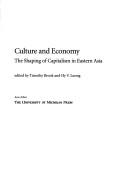
ISBN: 0472107763 0472085980 Year: 1997 Publisher: Ann Arbor University of Michigan press
Abstract | Keywords | Export | Availability | Bookmark
 Loading...
Loading...Choose an application
- Reference Manager
- EndNote
- RefWorks (Direct export to RefWorks)
In recent years, most of the economies of Eastern Asia have been absorbed into global capitalism. Capitalism has transformed these economies, but the process has not been one-way. The cultures of Eastern Asia have in turn shaped how capitalism organizes labor, capital, and markets in ways that could not have been anticipated even ten years ago. On the basis of rich empirical analyses of East and Southeast Asia, and with theoretical insights from different approaches in the social sciences, 'Culture and Economy' addresses these issues in both macroscopic and microscopic terms. Specific topics discussed range from the use and reinvention of Confucian and Islamic legacies in South Korea and Malaysia to promote a particular vision of the economy, to the role of family- and network-structured firms and the reliance on trust-based personal networks in Southeast Asia, to the cultures of labor and management in Chinese village enterprises and Vietnamese ceramics firms, as well as in South Korean export processing zones and the current Chinese labor market. These careful case studies suggest that it is inevitable that Eastern Asia will shape, even remake, capitalism into a system of production and consumption beyond its original definition. Timothy Brook is Professor of History, Stanford University. Hy V. Luong is Professor of Anthropology, University of Toronto.
Capitalism --- National characteristics. --- East Asia --- Southeast Asia --- Economic conditions. --- Social life and customs. --- S10/0687 --- China: Economics, industry and commerce--Asia-China economic relations --- China: Economics, industry and commerce--Employment --- -Asia, East --- National characteristics --- S10/0251 --- S10/0330 --- S10/1000 --- Characteristics, National --- Identity, National --- Images, National --- National identity --- National images --- National psychology --- Psychology, National --- Anthropology --- Nationalism --- Social psychology --- Collective memory --- Ethnopsychology --- Exceptionalism --- Market economy --- Economics --- Profit --- Capital --- China: Economics, industry and commerce--General works and economic history: since 1989 --- China: Economics, industry and commerce--Business ethics and philosophy --- Asia, East --- Asia, Eastern --- East (Far East) --- Eastern Asia --- Far East --- Orient --- Capitalisme --- Asie du Sud-Est --- Extrême-Orient --- Economic conditions --- Social life and customs --- Conditions économiques --- Moeurs et coutumes
| Listing 1 - 10 of 10 |
Sort by
|

 Search
Search Feedback
Feedback About UniCat
About UniCat  Help
Help News
News